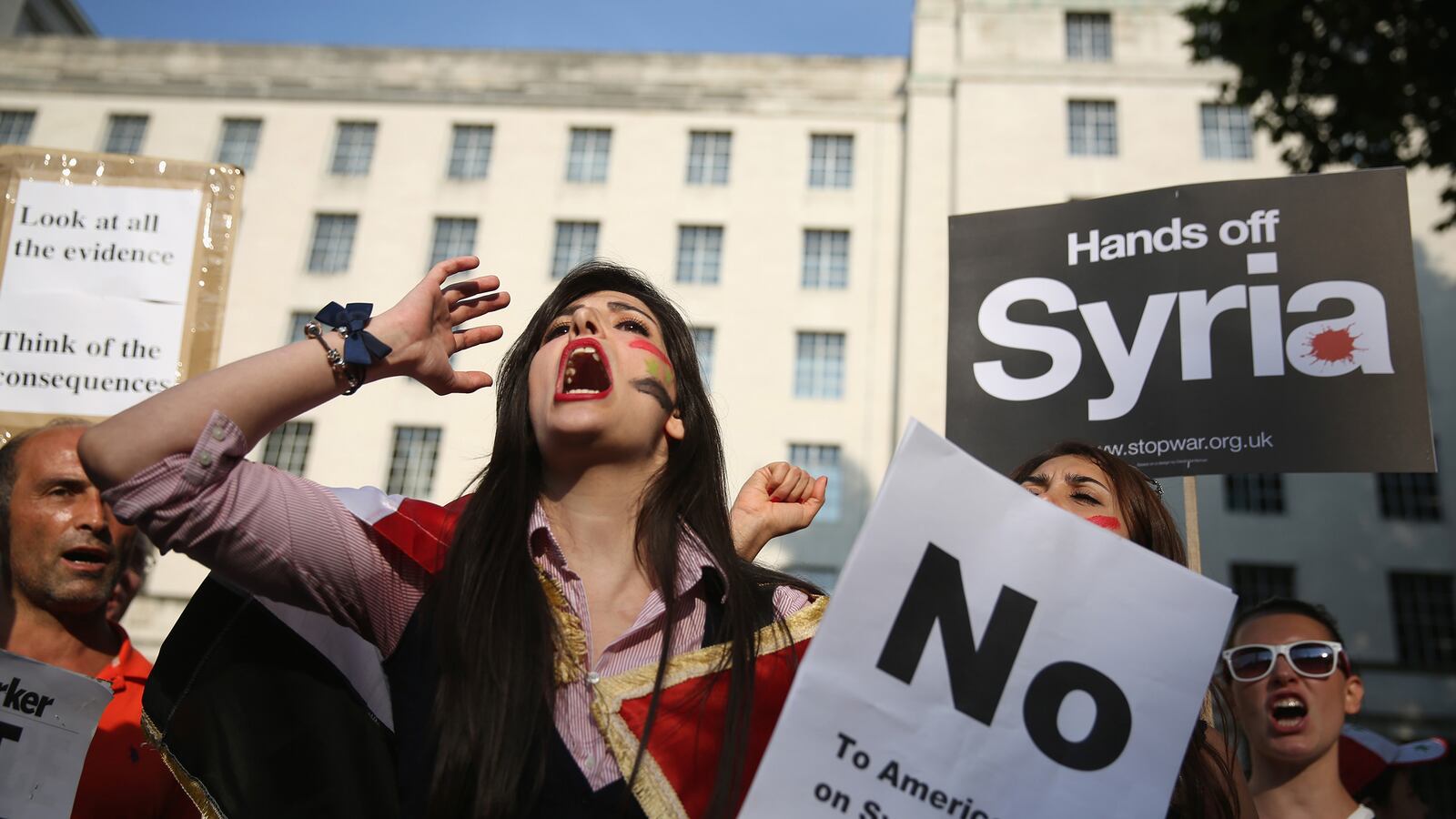As America slouches to war in Syria, top U.S. policy planners are preoccupied with calibrating our expected attack so that it is sufficiently muscular as to be above mockery—but not so muscular as to make any other powers angry. Literally. That’s how some officials explain what’s happening: they want to do something, but not too much.

The Obamans don’t want to win. They don’t want regime change. They just want to make a point. Most of all, they don’t want to look silly. So it’s not, say, Operation Syrian Freedom. Rather, it’s Operation Check the Box.
According to the Los Angeles Times, “One U.S. official who has been briefed on the options on Syria said he believed the White House would seek a level of intensity ‘just muscular enough not to get mocked’ but not so devastating that it would prompt a response from Syrian allies Iran and Russia.”
This sort of calculation—not too hot, not too cold—is better left to Goldilocks. Once the first missile is fired or the first bomb is dropped, war charts its own course.
In fact, we shouldn’t be overly surprised that the White House is working so hard to send a nuanced message on Syria, because that’s the way all these kinds of wars get fought.
In World War II, we wanted to win; we had to win. Period. It was clear enough to every American that Hitler and Tojo were bad news, and that was that. America had been attacked by Japan, and Hitler declared war on us. But in more recent wars, where the emphasis has been on “credibility,” not victory, the trumpet has been uncertain, at best. And at worst, we end up losing what we set out to gain.
We might consider, for example, Vietnam.
In 1965, Lyndon Johnson’s national-security adviser, McGeorge Bundy, acknowledged the uncertainty of the Vietnam War in a memo to his boss: “We cannot assert that a policy of sustained reprisal will succeed in changing the course of the contest in Vietnam. It may fail, and we cannot estimate the odds of success with any accuracy.”
That’s not quite Churchillian, is it?
LBJ and Bundy, the Yale-educated Harvard professor, got it wrong on a grand scale. The war drove Johnson from office, further fractured an already divided U.S., splintered the Democratic Party, and paved the way for the election in 1968 of Richard M. Nixon and Spiro T. Agnew.
In the end, over 58,000 Americans would die in the war, over 300,000 would be wounded, and this nation’s defeat—helicopters evacuating U.S. personnel from atop the Saigon embassy in 1975—would be memorialized on television for the world to watch and remember.
The central problem of that war, of course, was that it wasn’t obvious that the Vietnamese themselves agreed with our wishes as to that country’s destiny. Ho Chi Minh in Hanoi was a communist dictator, for sure, but had a genuine following. By contrast, our leaders in the South—not so much. Everybody knew that as soon as we left, the South would fall. And that’s what happened.
However, in Vietnam, at least we had somebody to like, if not love. By contrast, Syria is a raging cauldron of sectarian hatred and warfare. Unlike Vietnam, there are no clear “good guys” to root for, and our strategic and vital interests are even less apparent.
Our would-be “allies” have not hesitated to slaughter their Christian neighbors while simultaneously condemning the Assad regime for killing Sunni civilians with chemical weapons. To top it off, our would-be “friends” are backed by al Qaeda, in case anyone, including the president, has forgotten.
Both the left-leaning Independent in the U.K. and the right-leaning Drudge Report in the U.S. have run virtually the same headline: “Does Obama Know He’s Fighting on al Qaeda’s Side?”
Meanwhile, the Arab League has made clear that whatever we do, we will not be covered in glory. On the one hand, it condemns Syria’s use of chemical weapons as a “heinous crime,” and demands an international response. On the other, it has refused to endorse a Western-led retaliatory strike.
So, if the Arab League won’t put its boots where its mouth is, why should we? As Abdulkhaleq Abdullah, a political-science professor in Dubai, said to The Wall Street Journal, “Don’t expect a big cheer from us.” Abdullah continued, “If the results are fine, and the damage is very limited, I think that is gonna be a good sign. Maybe, ‘Wow, give America a D.’”
Back in the day—as America plunged itself ever more deeply into Vietnam, Bundy also told Johnson that “even if it fails, the policy will be worth it.” In that sense, Vietnam demonstrated America’s resolve to stand up against the Soviet Empire in the midst of the Cold War and, in the words of the late John F. Kennedy, “pay any price, bear any burden, meet any hardship.”
But Syria? No. At best, American involvement in Syria would be a military commitment taken in the aftermath of Barack Obama’s having carelessly tossed out the phrase “red line,” in the course of a reelection campaign.
Superpowers aren’t supposed to act rashly. Almost two centuries ago, the Duke of Wellington observed that “a great country can have no such thing as a little war.” As we stand poised to begin another Middle East adventure, we would do well to heed the words of the man who defeated Napoleon at Waterloo.
One thing's for sure. With British Prime Minister Cameron's defeat in Parliament, Obama will have a much tougher time finding a poodle if he decides to go it alone.






